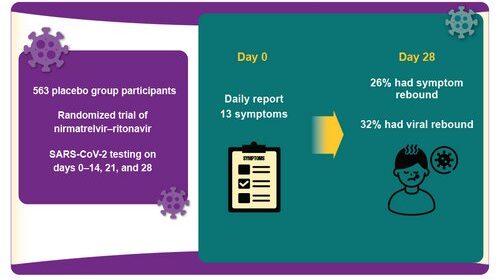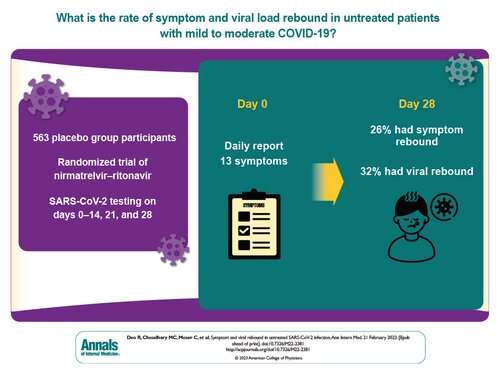Symptom and viral rebound uncommon after untreated COVID-19 infection


An analysis of a COVID-19 trial has found that a combination of symptoms and viral rebound after untreated COVID-19 infection is rare, occurring in only 3% of study participants. The analysis is published in Annals of Internal Medicine.
Nirmatrelvir–ritonavir is a recommended treatment for outpatients with mild to moderate COVID-19 and risk factors for severe disease. Widespread use of nirmatrelvir has been accompanied by reports of worsening symptoms and virologic rebound after treatment completion. Virologic rebound has also been reported in persons who did not receive nirmatrelvir therapy, but studies that can define the frequencies of symptom and viral rebound during the natural course of COVID-19 are lacking.
Researchers from Brigham and Women’s Hospital conducted an analysis of 563 participants receiving placebo in the ACTIV-2/A5401 (Adaptive Platform Treatment Trial for Outpatients With COVID-19) platform trial. The authors found that a combination of symptom and high-level viral rebound occurred in only 3% of participants. Symptom rebound alone occurred in 26% of participants 11 days after initial symptom onset and viral rebound alone occurred in 31% of participants. High-level viral rebound was observed in 13% of participants.
The researchers note that both symptom and viral rebound were short, lasting only one day in most participants. According to the authors, these results highlight the importance of accounting for underlying rates of symptom relapse in the absence of antiviral therapy when evaluating the effects of antiviral treatments.
More information:
Rinki Deo et al, Symptom and Viral Rebound in Untreated SARS-CoV-2 Infection, Annals of Internal Medicine (2023). DOI: 10.7326/M22-2381
Journal information:
Annals of Internal Medicine
Source: Read Full Article